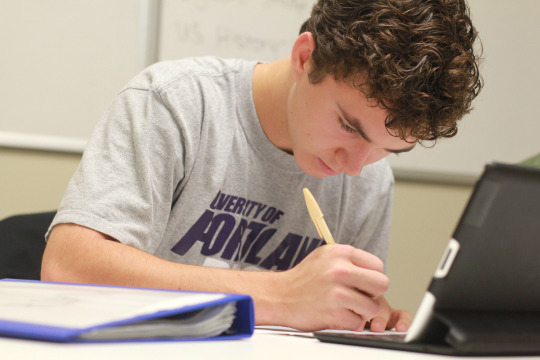
By Lucas McAdams, ESM Senior College Coach
For the majority of my students, the most time- and energy-consuming aspect of college admissions is essay writing. A typical college list (composed of a few “safety”, “target”, and “reach” schools) can easily average more than one essay per school, while a college list consisting of the most prestigious schools can require two or three essays per school. In some cases, this amounts to a total writing load in excess of what students are typically assigned in an entire year of high school. Of course, the real issues begin when students don’t properly space out this workload, waiting until September or October to get started, expecting that they can finish everything by their deadlines (usually November or January). While they may be able to complete everything in time, essays written under that sort of pressure are rarely exceptional.
In some ways, it makes sense to wait until after Labor Day to start essays. Schools don’t always post their supplemental essay prompts before September 1st, and the last thing a busy student wants is to write an entire essay only to later find that she wrote it on the wrong topic. Still, it’s possible to start the writing process long before fall of the senior year and still remain efficient, because when done properly, this essay writing process involves significant preparation, brainstorming, and planning.
This list does not necessarily need to be followed from #1 to #5; the proper order will differ from student to student. Also, not every student needs to complete each of these tasks. The idea is simply for students to find inspiration and begin to think about how they can tell their most powerful stories.
#1: Read Powerful Personal Writing. One of the most interesting challenges I’ve encountered when coaching students through their college essay writing process is the fact that students are rarely assigned autobiographical writing assignments in high school. Instead of being asked to reflect on their own experiences and beliefs, they are typically tasked with writing analytical essays, book reports, or research papers. This means that unless a student has kept a diary or journal on their own, they often don’t have much experience with the personal reflection that college essays require. An offshoot of this dynamic is that students often have little idea just how powerful and interesting autobiographical writing can be. One of my favorite assignments for sophomores and juniors is to have them find an autobiography or memoir from someone they are interested in.Choices abound, from David Sedaris to Malala Yousafzaito to Art Spiegelman. Even if students can’t find the time to finish an entire book (or two), reading a few inspiring passages can go a long way in helping them think about how they might write their own stories most effectively.
#2: Answer the Question: What Do I Want from My College? In my experience, the best college planning process consists of two main aspects: research and reflection. Too often students emphasize the former without considering the latter. When it comes to planning out their college list, students are often great at learning about and comparing different schools, but they don’t always take the time to sit down and reflect on exactly what they are looking for from their college experience. Doing this early and often helps to keep them on track as they’re planning their college list, and it has the added benefit of being useful later on while writing the all-too-common “Why College X?” supplement essay. Students should put pen to paper (or finger to keyboard) and reflect on questions like:
Whenever possible, students should move beyond the basics when writing their answers to these questions. Descriptions and details will be helpful when it comes time to repurpose these notes into an essay.

#3: Explore the Prompts
As I mentioned before, supplemental prompts often aren’t finalized until the early fall, but if you know where to look in the spring or summer, it’s possible to get a good sense for what some of your main essays will require. First of all, the personal statement writing prompts for the Common App are already finalized, so it’s a good idea for students to familiarize themselves with those. What they will notice is that the prompts are quite broad, allowing for students to tell essentially whatever story they want (more on this later).Another set of prompts I’ve been having juniors check out is the UC personal insight questions. Although these are not finalized yet for the high school class of 2018, they present eight questions that are useful for students to consider. Many colleges ask similar supplemental questions, and answering these can often help students identify what their most powerful stories are. While brainstorming, students should keep notes that they can reference when it comes time to actually write their essays.
#4: Complete the Values and Experiences Exercise Some students come into the essay writing process with a clear vision for what they want to write, or at least for what their strongest stories are likely to be. If that’s the case, great; they should maintain that momentum and dive right into writing. However, most students are less sure of what stories they want to tell.
Given that the Common App personal statement prompts are so broad, I like to have these students start off with the “Values and Experiences” exercise. To begin, I have students write down the positive characteristics that define them. There are thousands of adjectives to choose from – “hardworking”, “creative”, “spontaneous” – anything that they feel represents their character. When they start to run out of ideas, I ask them to consider what other people would say. How would your parents define you? You friends? Teachers? Coaches? I try to keep students brainstorming for 15-20 minutes.
Often, the most interesting words come only after students have been forced to think hard. With this list of characteristics generated, I then tell students to take each adjective and consider which activities, experiences, events, or other aspects of their lives reflect that word. For “hard-working”, a student might think of the time in which she spent an entire weekend revamping her elderly neighbor’s landscaping. For “creative”, she could talk about the YouTube channel she maintained for the past few years. For “spontaneous”, she might mention the time she managed to talk her mom into going sky-diving with her. Whenever possible, students should think of multiple experiences, activities, or events for each attribute, as the best essays are often written about subjects that reflect multiple characteristics. Whether or not a student starts writing the personal statement immediately after completing this exercise, it will still be a useful resources for inspiration moving forward.
#5: Read Successful Example Essays. Many students find it beneficial to see examples of successful essays from the past, especially because they often aren’t as familiar with autobiographical writing as we’d like them to be. These can be found from a variety of sources online, as well as from school counselors or private college coaches. I list this step last because I’ve found that some students didn’t like reading essays from my previous students. At worst, I’ve seen a few students lose motivation for writing their own essays because they found the samples so out of touch with their own experience .If you are going to read example essays, it’s worthwhile to seek out a sample that is similar to your own background. If you aren’t going to talk about a “life-or-death” experience, then you might not find it useful to read about the time someone gave CPR to a stranger at the public pool. If you have no experience in sports, then you might not be interested in reading someone’s personal statement about their devotion to lacrosse. However, there are always smaller details that you can pick and choose from each essay you read; keep an open mind and search for inspiration wherever you can!